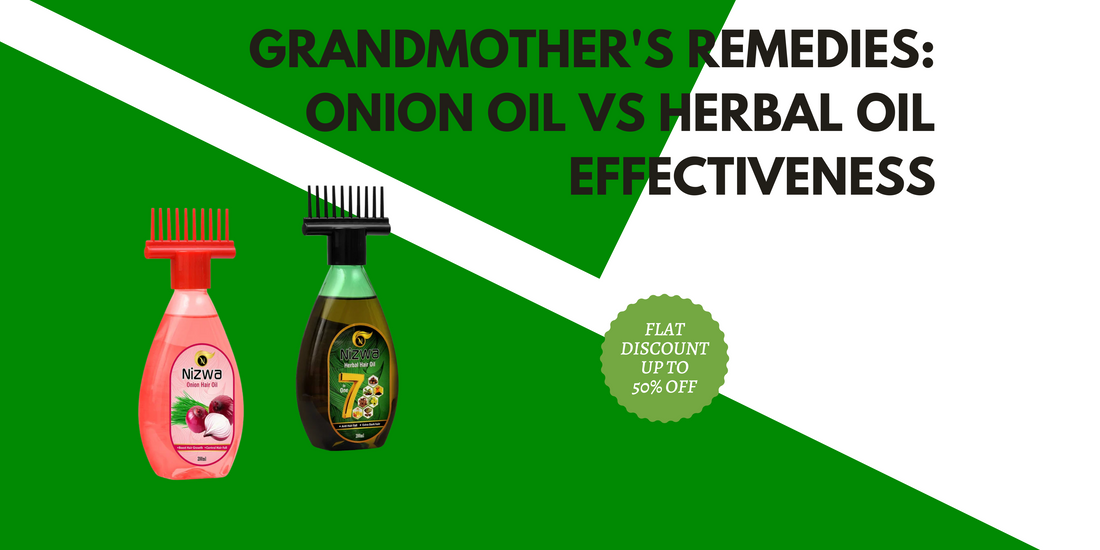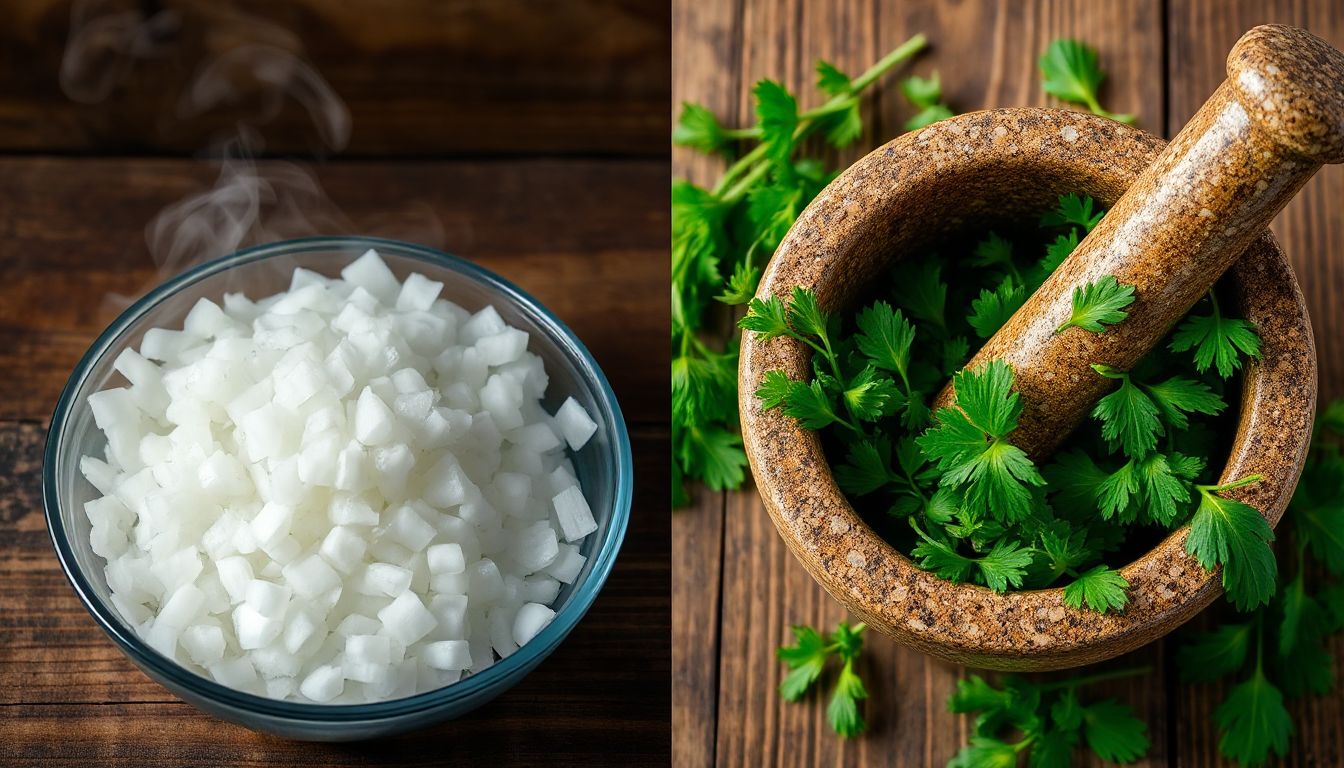
Onion vs Herbal: Grandma’s Hair Secrets
The wisdom of past generations often holds powerful secrets. Many grandmothers swore by natural ingredients for health and beauty. Today, more people want to use these old methods. They worry about chemicals in modern products.
Two popular hair care methods from long ago used natural oils. Onion oil and various herbal oils stand out. Both aim for strong, healthy hair. This article looks at which one works better for hair growth and overall hair health.
The Power of Onion Oil: Science Meets Tradition
Understanding Onion Oil's Composition and Benefits
Onion oil comes from a common kitchen staple. Its strong smell hides powerful benefits for hair. This oil is rich in nutrients and compounds. It offers a natural way to boost hair health.
The Sulfur Secret: How Onion Oil Stimulates Hair Growth
Onion oil has a lot of sulfur. Sulfur is key to making keratin. Keratin is the main protein in your hair. This oil also helps blood flow to your scalp. Better blood flow means more nutrients reach hair follicles. Onion oil may also fight germs. It has natural antibacterial and antifungal properties. These keep your scalp clean and healthy.
Practical Application: Methods for Using Onion Oil
You can make onion oil at home. Cold-pressed methods keep most nutrients. Simmering onions with a carrier oil like coconut oil also works well. To use it, warm the oil a little. Massage it into your scalp using your fingertips. Cover all areas of your head. Leave it on for at least 30 minutes. You can also leave it overnight. Wash it out with a mild shampoo. A little lemon juice or essential oil helps with the strong smell.
Real-World Experiences and Potential Side Effects
Many people say onion oil helps their hair grow thicker. They report less hair fall, too. Some say their hair becomes shinier. Still, onion oil can sometimes irritate the scalp. A few people might have an allergic reaction. Always do a patch test first. Put a small amount on your skin behind your ear. Wait 24 hours to check for any redness or itchiness.
The Diverse World of Herbal Oils for Hair
Exploring the Multifaceted Benefits of Herbal Hair Oils
Herbal oils offer a wide range of benefits for hair. Each plant brings its own special properties. These oils come from different parts of plants. They are often blended together for more power.
Key Herbal Oils and Their Specific Properties
Rosemary oil is known for boosting hair growth. Lavender oil helps calm the scalp and ease stress. Peppermint oil can stimulate blood flow to follicles. Castor oil makes hair stronger and thicker. Coconut oil deeply moisturizes and adds shine. Each oil targets different hair problems.
Synergistic Blends: The Power of Combining Herbs
Mixing herbal oils can create super-powerful treatments. For example, rosemary and peppermint together may boost growth even more. Carrier oils like almond or jojoba oil are important. They dilute potent essential oils. Carrier oils also help deliver the herb's benefits deep into your hair and scalp. These blends make treatments more effective.
How to Choose and Use Herbal Oils Effectively
Pick herbal oils based on your hair's needs. If your hair is dry, choose coconut or argan oil. For thinning hair, rosemary or peppermint might be best. Always dilute essential oils with a carrier oil. A good rule is a few drops of essential oil per tablespoon of carrier oil. Apply the blend to your scalp and hair. Gently massage it in. Leave it on for an hour or more. Then wash it out.
| Feature | Onion Oil | Herbal Oils | Combined Use |
|---|---|---|---|
| Main Benefit | Stimulates growth (sulfur) | Nourishes scalp & hair | Growth + nourishment |
| Best For | Hair loss, regrowth | Shine, strength, scalp health | Comprehensive care |
| Key Ingredient | Sulfur | Rosemary/coconut/castor | Onion + rosemary ideal mix |
| Dandruff Help | Yes (antifungal) | Yes (tea tree/neem) | Enhanced protection |
| Moisturizing | Moderate | High | Balanced hydration |
| Application | 1-2x/week | 1-3x/week | Alternate weeks or mix |
| Results Time | 4-6 weeks | 3-4 weeks | 5-6 weeks for full benefits |
Onion Oil vs. Herbal Oil: A Comparative Analysis
Effectiveness for Hair Growth and Thickness
Both onion oil and herbal oils aim to boost hair growth. Each works in its own way. Onion oil's sulfur content directly aids keratin production. Herbal oils often stimulate follicles or improve scalp health.
Scientific Studies and Evidence
Some studies show onion juice helps with alopecia. This means it can help hair grow back. Research on specific herbal oils also exists. Rosemary oil, for example, shows promise for growth. It works similarly to some hair growth medicines. More direct studies comparing onion oil to blends of herbal oils are still needed. Many results come from personal stories.
Addressing Specific Hair Concerns
For severe hair thinning, onion oil might be a stronger choice due to its high sulfur. It helps produce hair-building blocks. Herbal oils are good for general hair health. They can make hair stronger and prevent breakage. Different herbal blends target different types of hair loss. For instance, peppermint oil can help with poor blood flow.
Scalp Health and Conditioning Properties
Keeping your scalp healthy is key for hair growth. Both types of oils help here. They can improve many scalp issues.
Impact on Dandruff and Itchiness
Onion oil has natural anti-fungal properties. These can help fight dandruff-causing fungi. Certain herbal oils also combat dandruff. Tea tree oil is famous for this. Peppermint oil can soothe an itchy scalp. Both options offer relief, but the specific herb matters for the exact issues.
Moisturizing and Shine Enhancement
Coconut and argan herbal oils are excellent moisturizers. They penetrate the hair shaft well. This makes hair soft and shiny. Onion oil also offers some moisture. Its main strength, though, is more about stimulating growth. It may not add as much shine as rich herbal oils.
Expert Opinions and User Testimonials
Dermatologist and Trichologist Insights
Hair doctors and specialists recognize the benefits of natural oils. Many agree that ingredients like sulfur in onion oil are good for hair. They also support the use of plant extracts for hair health. These experts often say natural remedies can complement traditional treatments. They are not usually a full replacement.
Professional Perspectives on Natural Hair Treatments
Experts often suggest caution. They advise against relying only on natural oils for severe hair loss. But they confirm that many oils improve scalp health. They can also add shine and strength to hair. They stress that results vary greatly from person to person.
Recommendations for Incorporating Oils into Routines
Dermatologists suggest using these oils once or twice a week. They say to apply them as a pre-shampoo treatment. Always wash your hair well afterward. If you use other hair treatments, check with your doctor first. Make sure the oils won't cause bad reactions.
Real User Experiences and Results
Lots of people share their success stories online. Some users report seeing new baby hairs after using onion oil for months. Others praise herbal blends for making their hair feel softer and look fuller. Reviews often highlight consistency as key. Before-and-after pictures show real changes for many users. Most people feel happier with their hair after using these oils regularly.
Making an Informed Choice: Which Oil is Right for You?
Choosing the best oil depends on your hair's unique needs. Every head of hair is different. Consider your specific hair problems.
Factors to Consider for Personalized Hair Care
First, know your hair type. Is it oily, dry, fine, or coarse? Do you have dandruff or an itchy scalp? Are you losing a lot of hair? Answering these questions guides your choice. For example, if your scalp is oily, some heavy oils might not be best.
Assessing Your Hair Type and Concerns
If hair thinning is your main worry, onion oil might be a good start. Its sulfur content is a direct aid for hair growth. If you seek general hair health, shine, or a soothing scalp, herbal oils offer many choices. You might even find a blend perfect for your hair.
Patch Testing and Gradual Introduction
Always do a patch test before full use. This helps avoid bad reactions. Put a tiny bit of the oil on your forearm. Wait a day to see if your skin reacts. Start with small amounts of oil. Use it less often at first. Slowly increase use as your hair and scalp get used to it.
Recommended Application Frequencies and Duration
For most oil treatments, using them once or twice a week is enough. Leave the oil on for 30 minutes to an hour. Some people leave it on overnight. Always rinse your hair well. Make sure no oil is left to weigh down your hair.
Combining Oils for Enhanced Benefits
Feel free to mix and match. You can blend a few drops of onion oil with a carrier oil. Then add a few drops of your favorite essential oil like lavender for smell. This creates a custom hair treatment. This way, you get the benefits of several natural ingredients all at once.
Conclusion: Embracing Nature for Healthier Hair
Both onion oil and herbal oils offer amazing benefits for hair. Onion oil excels in stimulating growth due to its high sulfur. Herbal oils provide diverse benefits, from moisturizing to soothing the scalp. Your grandmother's remedies truly hold timeless value.
The best oil is the one that works for you. Try different ones and pay attention to your hair's response. Embrace these natural methods. They can lead to healthier, more beautiful hair.
FAQs: Onion Oil vs. Herbal Oil for Hair Growth
1. Which is better for hair growth: onion oil or herbal oil?
Onion oil is rich in sulfur, which strengthens hair and stimulates follicles. Herbal oils like rosemary, castor, or amla nourish the scalp and improve hair health. Choose onion oil for hair regrowth and herbal oils for overall hair care.
2. Does onion oil smell bad? Can I reduce the odor?
Yes, onion oil has a strong smell. To mask it, mix with lavender or peppermint essential oil, add a few drops of lemon juice, or use deodorized onion oil available in stores.
3. Can herbal oils stop hair fall?
Some herbal oils like bhringraj, rosemary, or fenugreek oil may reduce hair fall by strengthening roots and improving scalp health. Results vary based on the cause of hair loss.
4. How often should I use onion oil for hair growth?
Apply 1-2 times weekly, leaving it for 30 minutes to overnight. Overuse may cause scalp irritation.
5. Which oil is best for dandruff: onion or herbal?
Onion oil has antifungal properties that fight dandruff. Herbal oils like tea tree or neem oil also combat dandruff effectively.
6. Can I mix onion oil with herbal oils?
Yes! Combining onion oil with coconut or rosemary oil boosts benefits. Try mixing 2 tbsp onion oil, 1 tbsp coconut oil, and 5 drops rosemary oil.
7. How long until I see results?
With onion oil, expect reduced hair fall in 4-6 weeks and new growth in 2-3 months. Herbal oils improve shine and scalp health in 3-4 weeks, with reduced breakage in 6-8 weeks.
8. Are there side effects?
Onion oil may irritate sensitive scalps (always patch test first). Herbal oils like peppermint can cause tingling, so dilute before use.
9. Which is better for thin hair?
Onion oil may thicken hair shafts, while castor or rosemary herbal oil can add volume.
10. Can these oils regrow lost hair?
They may improve thickness and reduce shedding, but severe baldness may require medical treatment.


